Application of Benner's Novice to Expert Theory in Nursing Education
VerifiedAdded on 2021/10/01
|15
|1123
|438
Report
AI Summary
This report provides an overview of Patricia Benner's Novice to Expert theory, which outlines the stages of clinical competence in nursing. The theory categorizes nurses into five levels: novice, advanced beginner, competent, proficient, and expert. The report explains how nurses develop skills and knowledge through experiences and encounters in clinical settings. It emphasizes the significance of the theory in clinical decision-making, highlighting how experience influences nurses' actions. The report also details each stage, describing the characteristics and abilities of nurses at each level, from relying on rules to using intuition and deep understanding. The references include several sources that support the theory and its application in nursing practice and education.
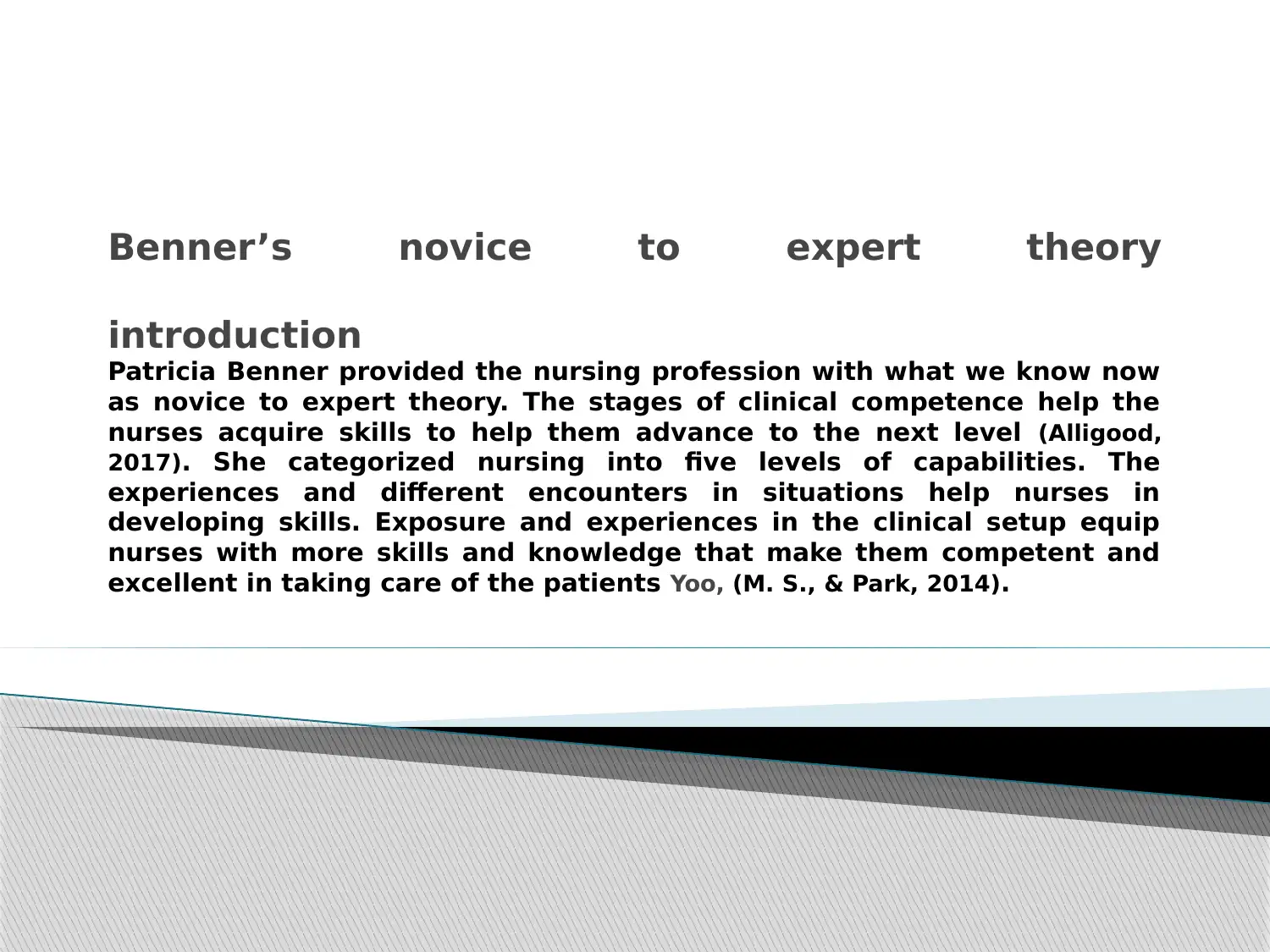
Benner’s novice to expert theory
introduction
Patricia Benner provided the nursing profession with what we know now
as novice to expert theory. The stages of clinical competence help the
nurses acquire skills to help them advance to the next level (Alligood,
2017). She categorized nursing into five levels of capabilities. The
experiences and different encounters in situations help nurses in
developing skills. Exposure and experiences in the clinical setup equip
nurses with more skills and knowledge that make them competent and
excellent in taking care of the patients Yoo, (M. S., & Park, 2014).
introduction
Patricia Benner provided the nursing profession with what we know now
as novice to expert theory. The stages of clinical competence help the
nurses acquire skills to help them advance to the next level (Alligood,
2017). She categorized nursing into five levels of capabilities. The
experiences and different encounters in situations help nurses in
developing skills. Exposure and experiences in the clinical setup equip
nurses with more skills and knowledge that make them competent and
excellent in taking care of the patients Yoo, (M. S., & Park, 2014).
Paraphrase This Document
Need a fresh take? Get an instant paraphrase of this document with our AI Paraphraser
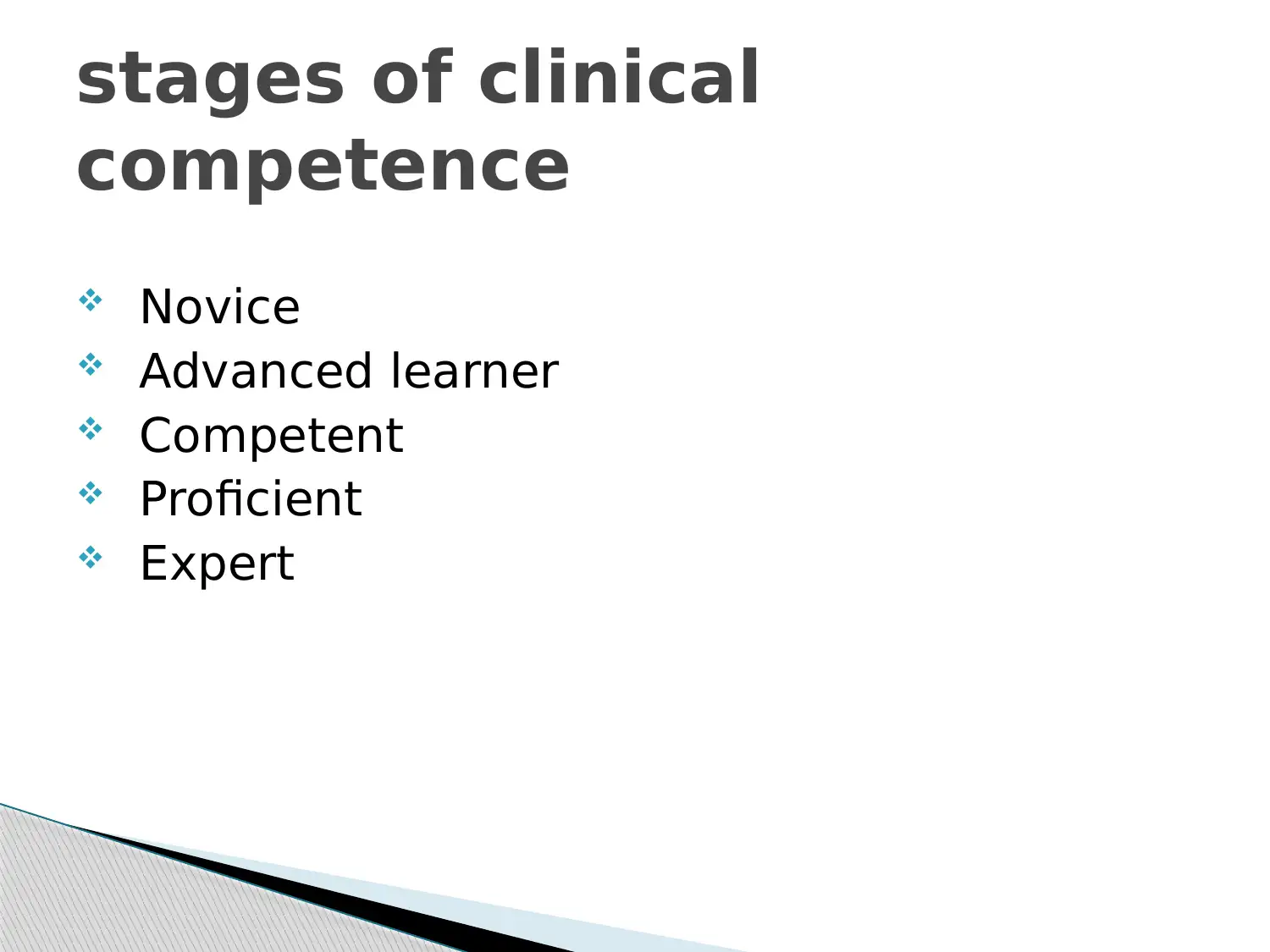
Novice
Advanced learner
Competent
Proficient
Expert
stages of clinical
competence
Advanced learner
Competent
Proficient
Expert
stages of clinical
competence
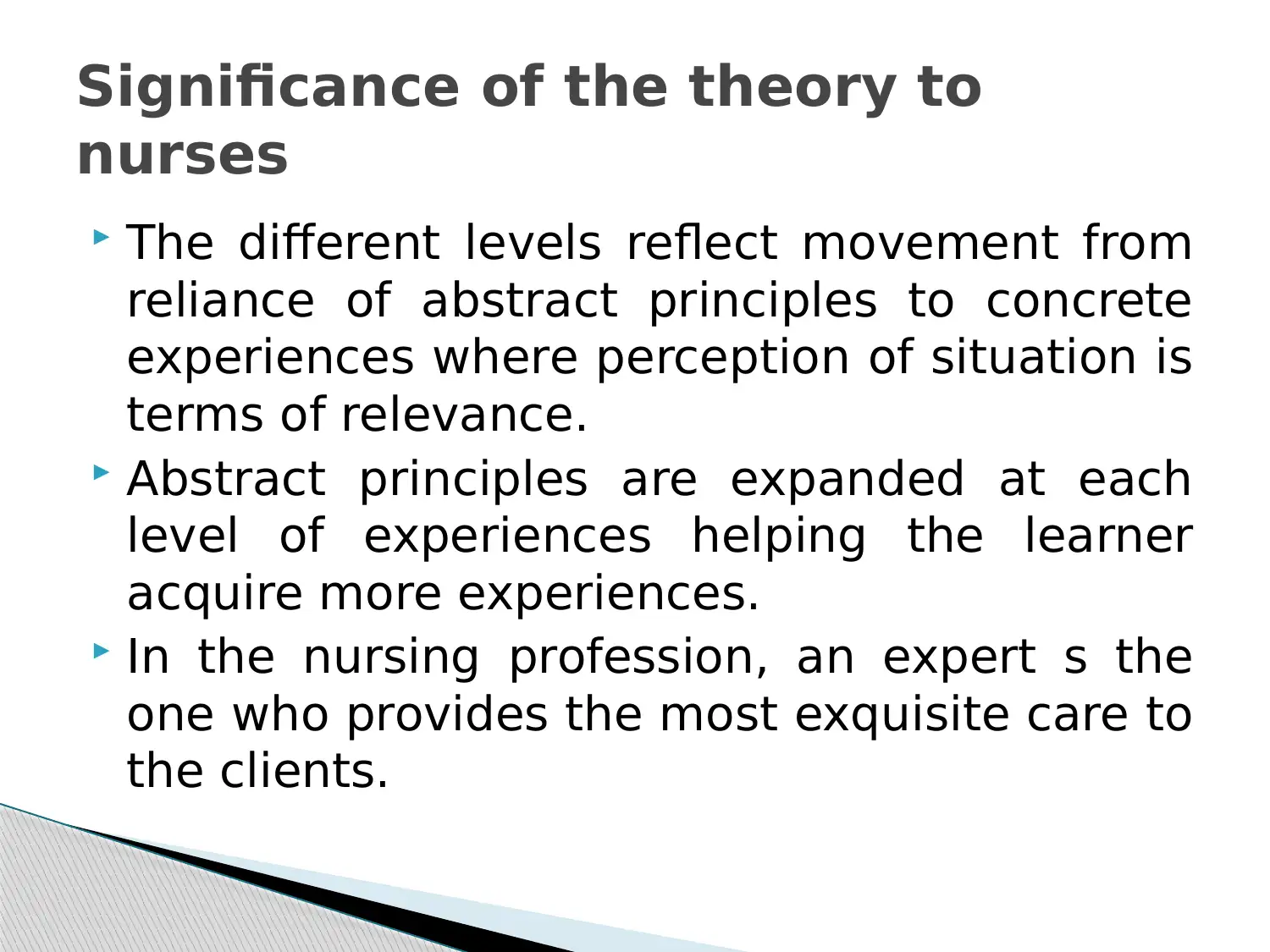
The different levels reflect movement from
reliance of abstract principles to concrete
experiences where perception of situation is
terms of relevance.
Abstract principles are expanded at each
level of experiences helping the learner
acquire more experiences.
In the nursing profession, an expert s the
one who provides the most exquisite care to
the clients.
Significance of the theory to
nurses
reliance of abstract principles to concrete
experiences where perception of situation is
terms of relevance.
Abstract principles are expanded at each
level of experiences helping the learner
acquire more experiences.
In the nursing profession, an expert s the
one who provides the most exquisite care to
the clients.
Significance of the theory to
nurses
⊘ This is a preview!⊘
Do you want full access?
Subscribe today to unlock all pages.

Trusted by 1+ million students worldwide
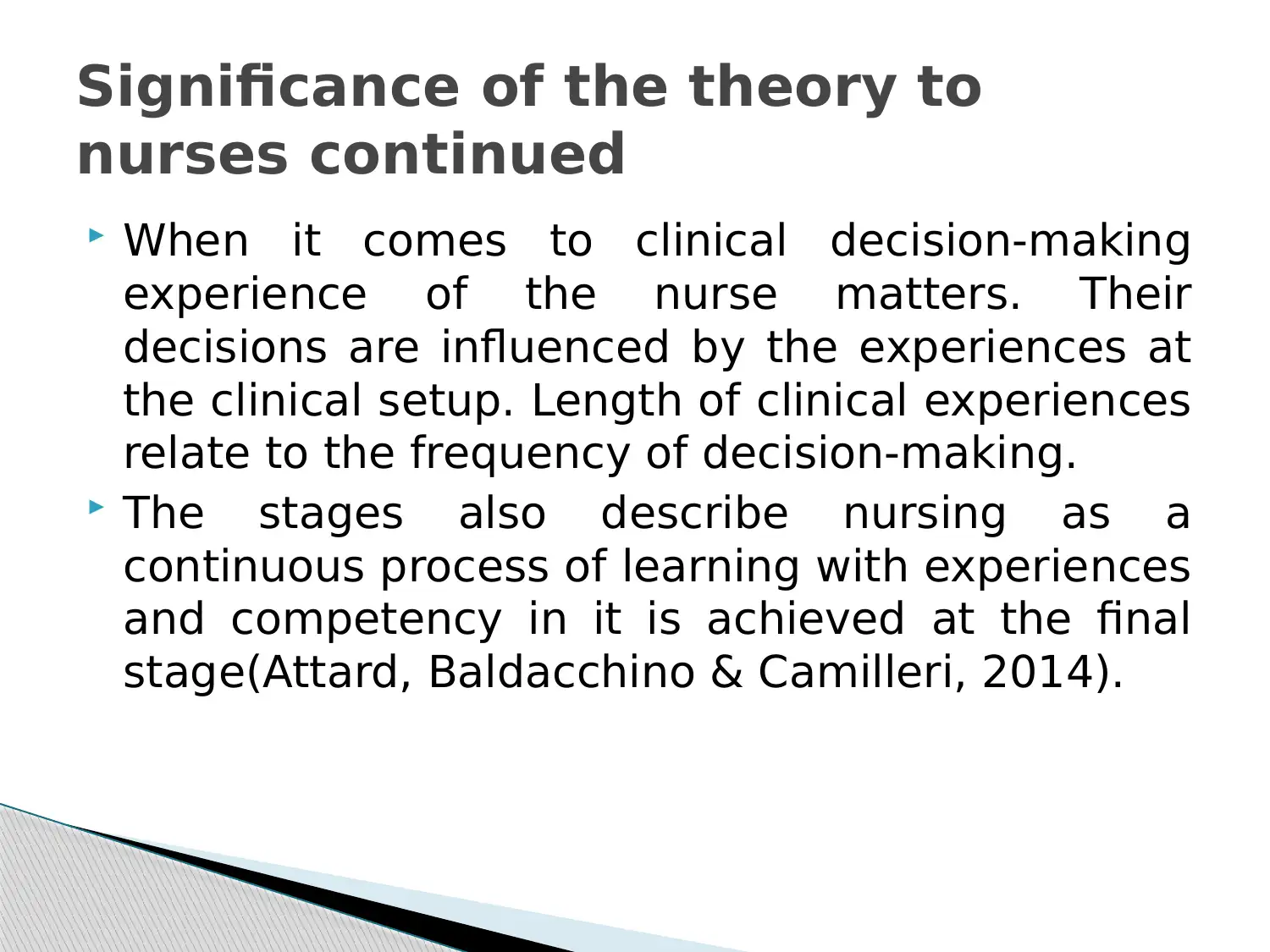
When it comes to clinical decision-making
experience of the nurse matters. Their
decisions are influenced by the experiences at
the clinical setup. Length of clinical experiences
relate to the frequency of decision-making.
The stages also describe nursing as a
continuous process of learning with experiences
and competency in it is achieved at the final
stage(Attard, Baldacchino & Camilleri, 2014).
Significance of the theory to
nurses continued
experience of the nurse matters. Their
decisions are influenced by the experiences at
the clinical setup. Length of clinical experiences
relate to the frequency of decision-making.
The stages also describe nursing as a
continuous process of learning with experiences
and competency in it is achieved at the final
stage(Attard, Baldacchino & Camilleri, 2014).
Significance of the theory to
nurses continued
Paraphrase This Document
Need a fresh take? Get an instant paraphrase of this document with our AI Paraphraser
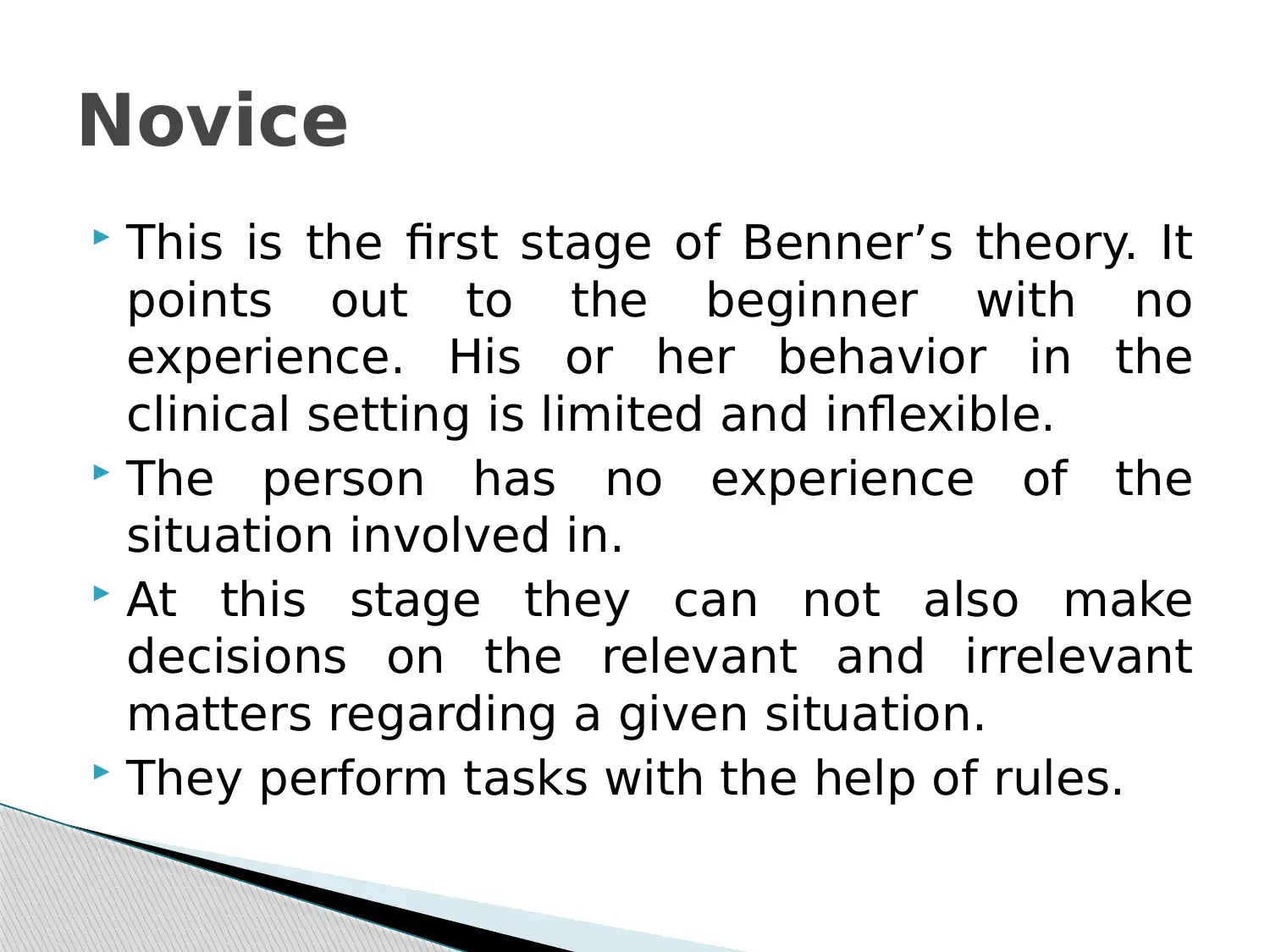
This is the first stage of Benner’s theory. It
points out to the beginner with no
experience. His or her behavior in the
clinical setting is limited and inflexible.
The person has no experience of the
situation involved in.
At this stage they can not also make
decisions on the relevant and irrelevant
matters regarding a given situation.
They perform tasks with the help of rules.
Novice
points out to the beginner with no
experience. His or her behavior in the
clinical setting is limited and inflexible.
The person has no experience of the
situation involved in.
At this stage they can not also make
decisions on the relevant and irrelevant
matters regarding a given situation.
They perform tasks with the help of rules.
Novice
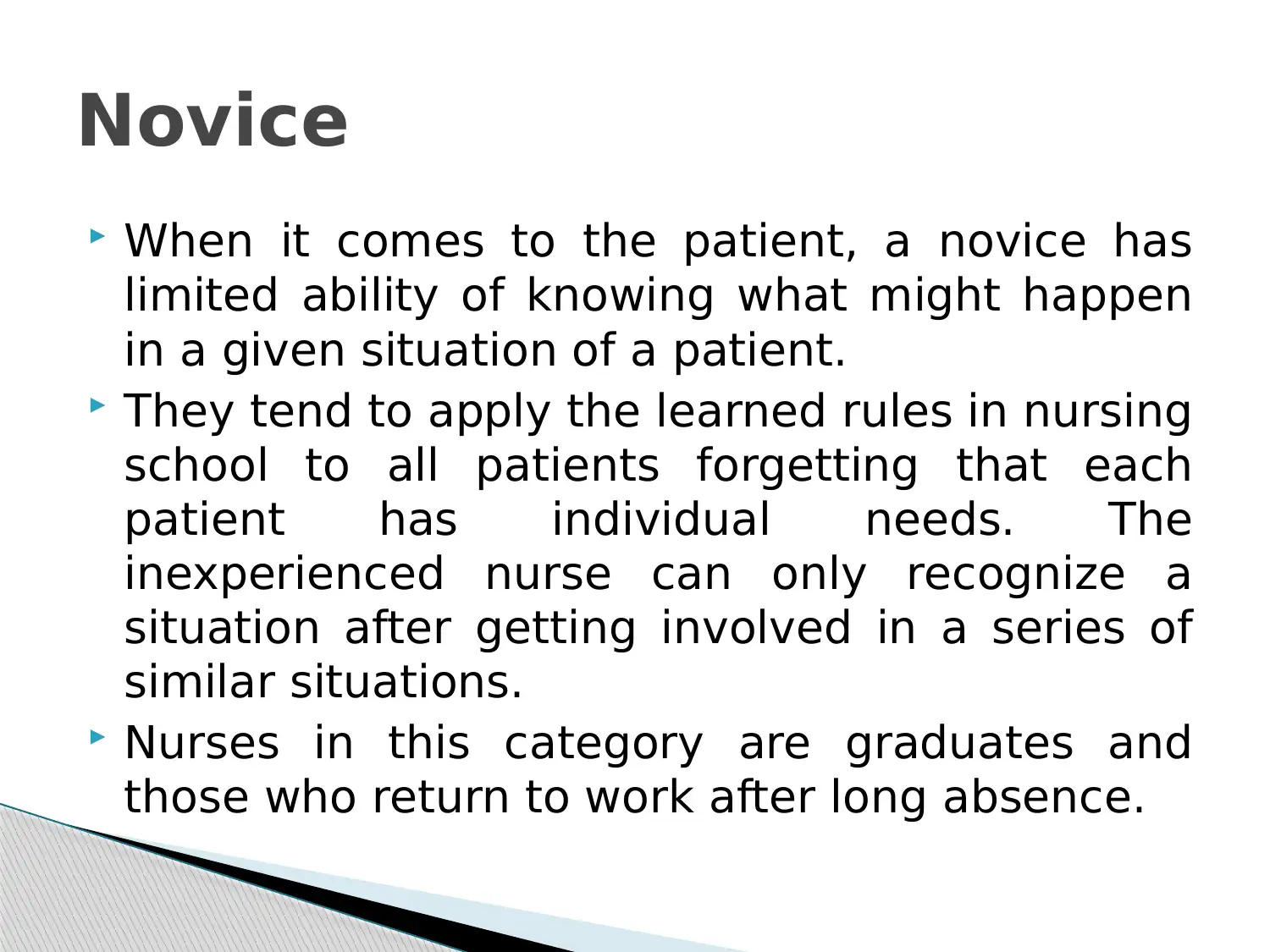
When it comes to the patient, a novice has
limited ability of knowing what might happen
in a given situation of a patient.
They tend to apply the learned rules in nursing
school to all patients forgetting that each
patient has individual needs. The
inexperienced nurse can only recognize a
situation after getting involved in a series of
similar situations.
Nurses in this category are graduates and
those who return to work after long absence.
Novice
limited ability of knowing what might happen
in a given situation of a patient.
They tend to apply the learned rules in nursing
school to all patients forgetting that each
patient has individual needs. The
inexperienced nurse can only recognize a
situation after getting involved in a series of
similar situations.
Nurses in this category are graduates and
those who return to work after long absence.
Novice
⊘ This is a preview!⊘
Do you want full access?
Subscribe today to unlock all pages.

Trusted by 1+ million students worldwide
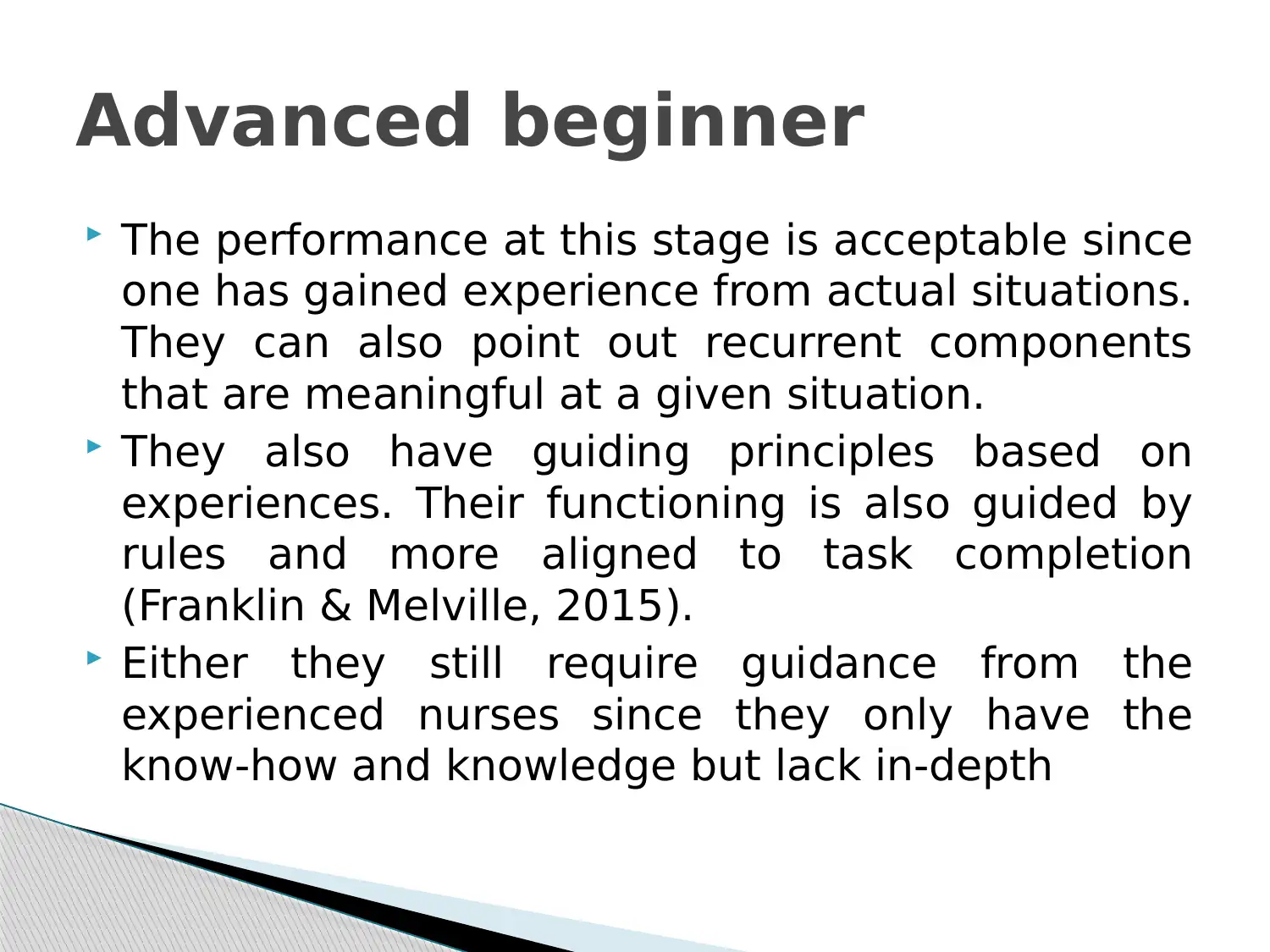
The performance at this stage is acceptable since
one has gained experience from actual situations.
They can also point out recurrent components
that are meaningful at a given situation.
They also have guiding principles based on
experiences. Their functioning is also guided by
rules and more aligned to task completion
(Franklin & Melville, 2015).
Either they still require guidance from the
experienced nurses since they only have the
know-how and knowledge but lack in-depth
Advanced beginner
one has gained experience from actual situations.
They can also point out recurrent components
that are meaningful at a given situation.
They also have guiding principles based on
experiences. Their functioning is also guided by
rules and more aligned to task completion
(Franklin & Melville, 2015).
Either they still require guidance from the
experienced nurses since they only have the
know-how and knowledge but lack in-depth
Advanced beginner
Paraphrase This Document
Need a fresh take? Get an instant paraphrase of this document with our AI Paraphraser
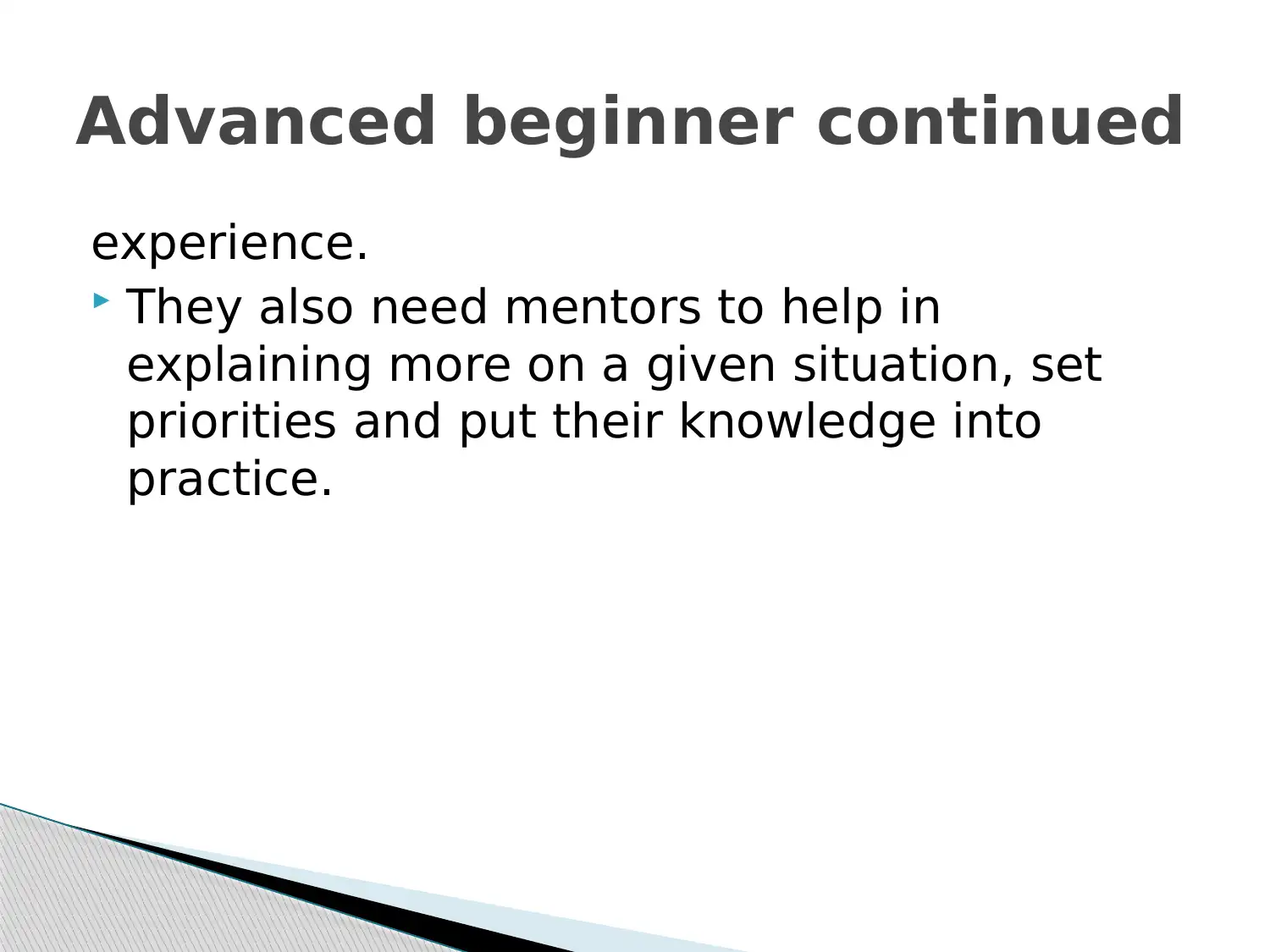
experience.
They also need mentors to help in
explaining more on a given situation, set
priorities and put their knowledge into
practice.
Advanced beginner continued
They also need mentors to help in
explaining more on a given situation, set
priorities and put their knowledge into
practice.
Advanced beginner continued
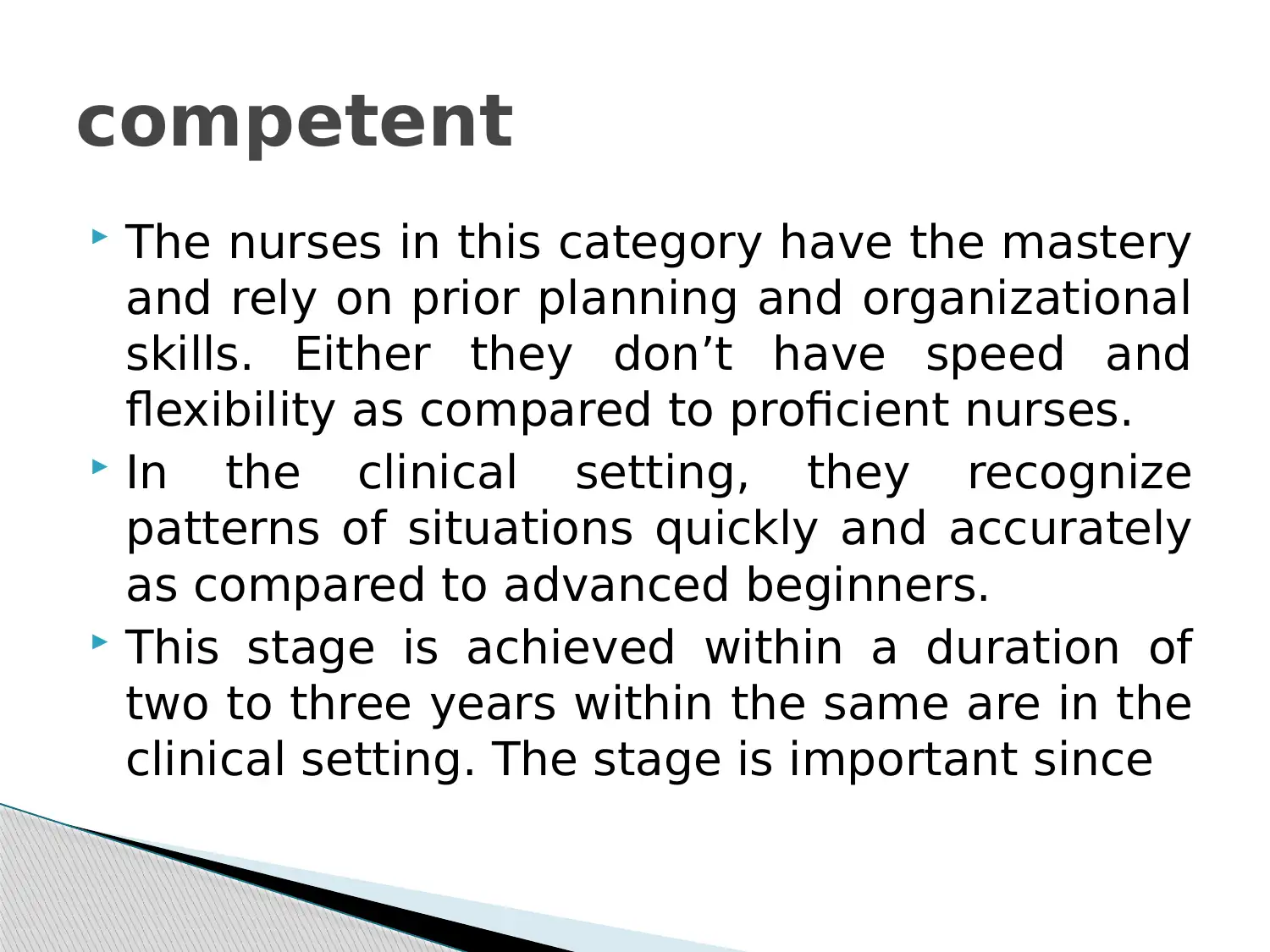
The nurses in this category have the mastery
and rely on prior planning and organizational
skills. Either they don’t have speed and
flexibility as compared to proficient nurses.
In the clinical setting, they recognize
patterns of situations quickly and accurately
as compared to advanced beginners.
This stage is achieved within a duration of
two to three years within the same are in the
clinical setting. The stage is important since
competent
and rely on prior planning and organizational
skills. Either they don’t have speed and
flexibility as compared to proficient nurses.
In the clinical setting, they recognize
patterns of situations quickly and accurately
as compared to advanced beginners.
This stage is achieved within a duration of
two to three years within the same are in the
clinical setting. The stage is important since
competent
⊘ This is a preview!⊘
Do you want full access?
Subscribe today to unlock all pages.

Trusted by 1+ million students worldwide
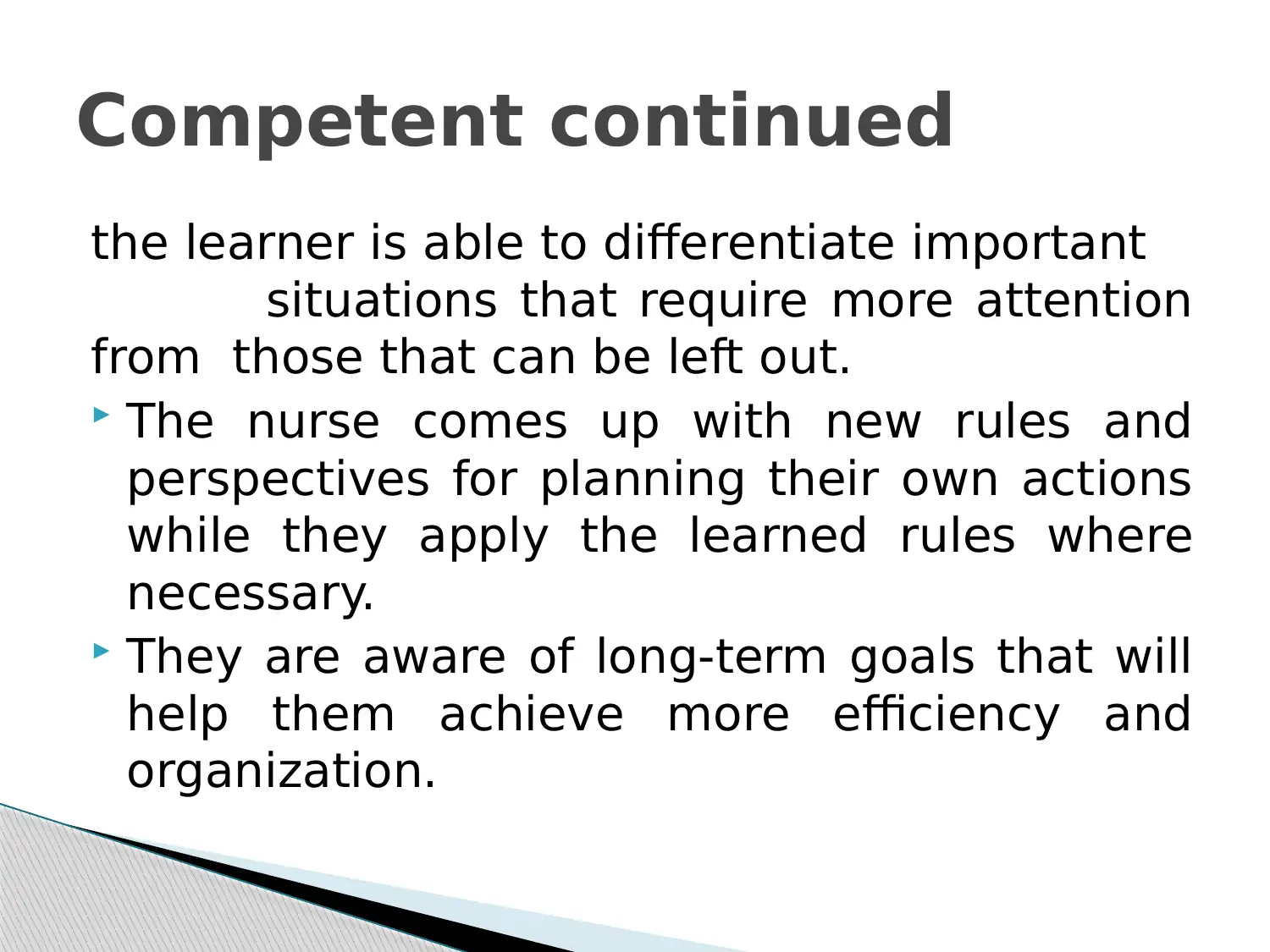
the learner is able to differentiate important
situations that require more attention
from those that can be left out.
The nurse comes up with new rules and
perspectives for planning their own actions
while they apply the learned rules where
necessary.
They are aware of long-term goals that will
help them achieve more efficiency and
organization.
Competent continued
situations that require more attention
from those that can be left out.
The nurse comes up with new rules and
perspectives for planning their own actions
while they apply the learned rules where
necessary.
They are aware of long-term goals that will
help them achieve more efficiency and
organization.
Competent continued
Paraphrase This Document
Need a fresh take? Get an instant paraphrase of this document with our AI Paraphraser
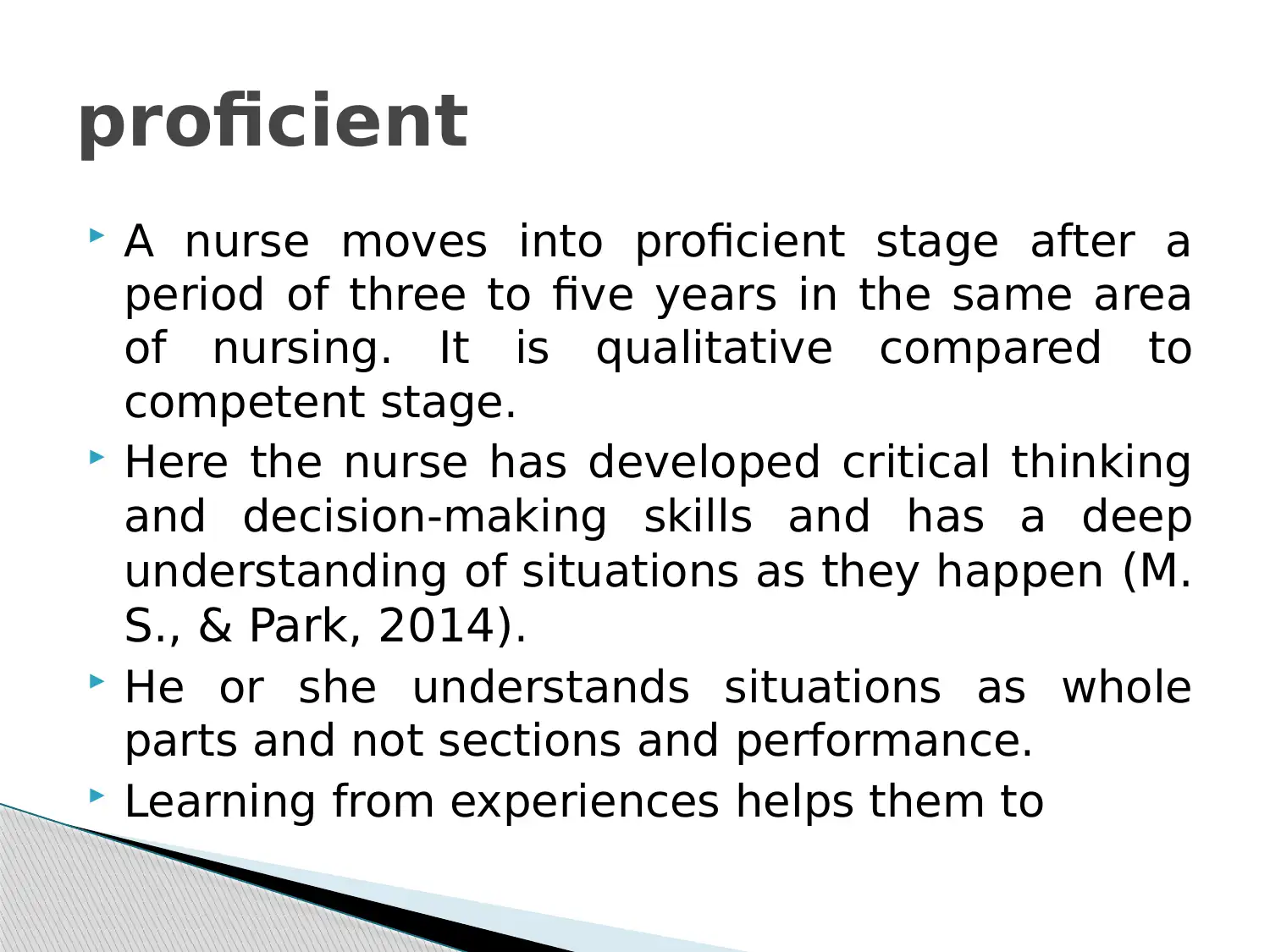
A nurse moves into proficient stage after a
period of three to five years in the same area
of nursing. It is qualitative compared to
competent stage.
Here the nurse has developed critical thinking
and decision-making skills and has a deep
understanding of situations as they happen (M.
S., & Park, 2014).
He or she understands situations as whole
parts and not sections and performance.
Learning from experiences helps them to
proficient
period of three to five years in the same area
of nursing. It is qualitative compared to
competent stage.
Here the nurse has developed critical thinking
and decision-making skills and has a deep
understanding of situations as they happen (M.
S., & Park, 2014).
He or she understands situations as whole
parts and not sections and performance.
Learning from experiences helps them to
proficient
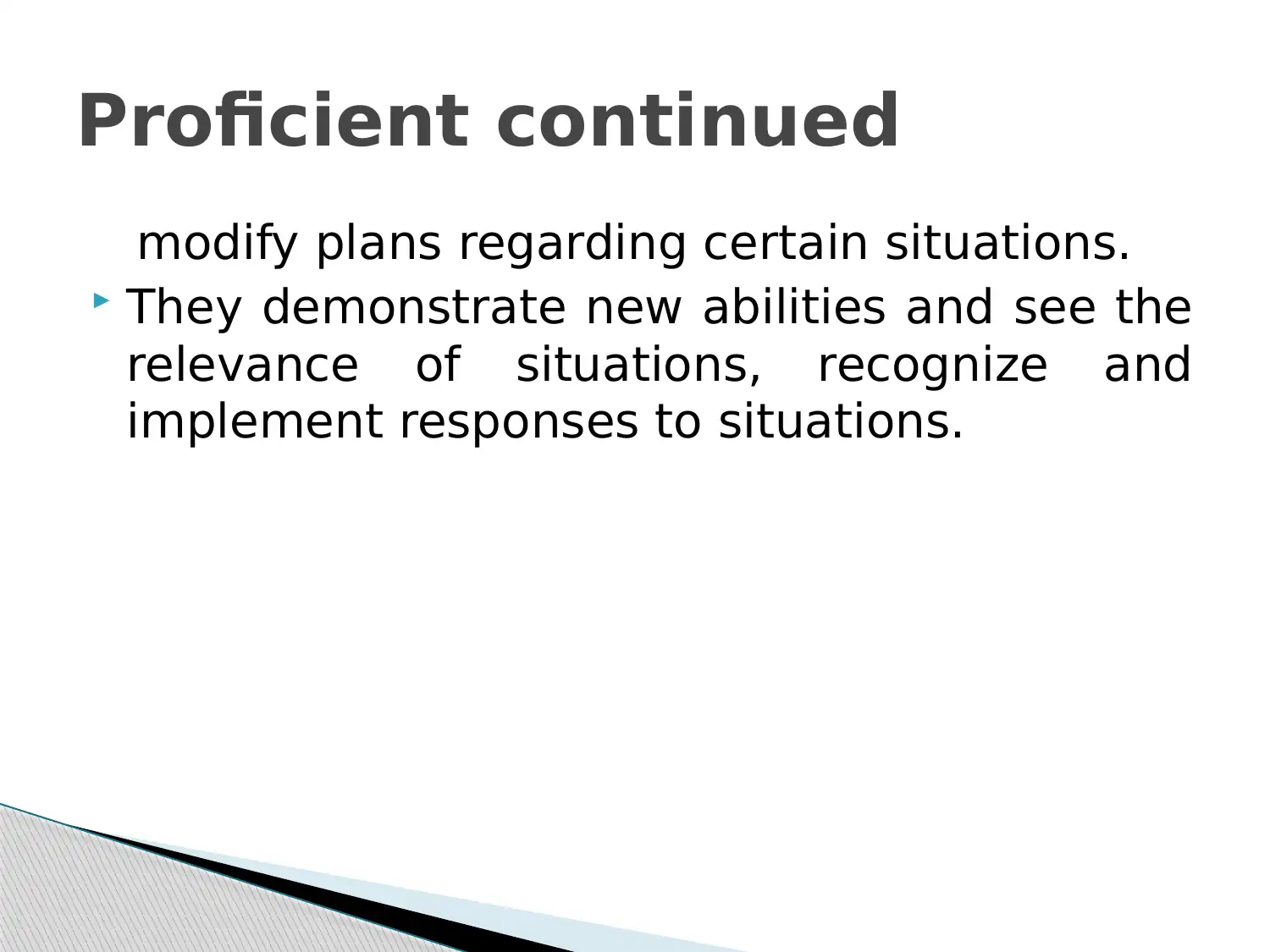
modify plans regarding certain situations.
They demonstrate new abilities and see the
relevance of situations, recognize and
implement responses to situations.
Proficient continued
They demonstrate new abilities and see the
relevance of situations, recognize and
implement responses to situations.
Proficient continued
⊘ This is a preview!⊘
Do you want full access?
Subscribe today to unlock all pages.

Trusted by 1+ million students worldwide
1 out of 15
Related Documents
Your All-in-One AI-Powered Toolkit for Academic Success.
+13062052269
info@desklib.com
Available 24*7 on WhatsApp / Email
![[object Object]](/_next/static/media/star-bottom.7253800d.svg)
Unlock your academic potential
Copyright © 2020–2026 A2Z Services. All Rights Reserved. Developed and managed by ZUCOL.





